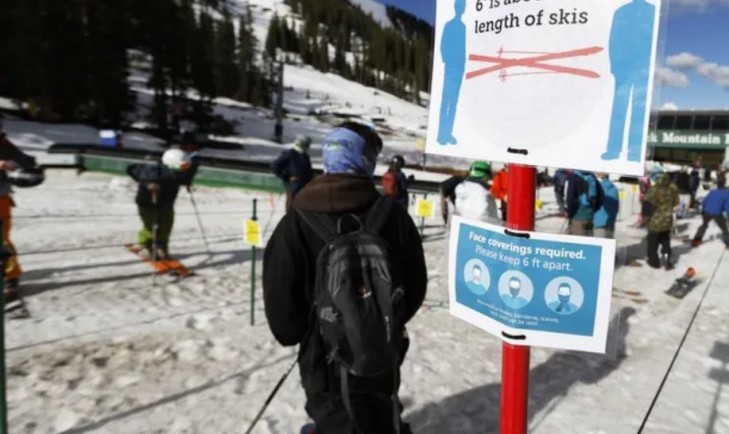
The Western Governors' Association keeps you updated on the latest news in the West. Here are the top stories for the week starting April 19, 2021. (Photo courtesy of the Colorado Sun)
The ‘20-21 ski season was the most challenging in recent memory for resort operators. Due to the reality of daily skier caps and reservation systems, limited seating at lodges and the absence of international travelers, nearly every resort hosted fewer skiers. However, thanks to some creative problem-solving, the loss of revenue was not as steep as many envisioned before the season.
With hopes for a busy ‘21-22 ski season as restrictions are loosened, resort executives say their companies are actively working to employ the lessons learned from the past season and will continue to adapt to meet visitor needs.“We’ve learned a lot, but the most important takeaway has been the flexibility and resiliency of our guests and staff,” said Liesl Hepburn, the public relations director for California’s Squaw Valley Alpine Meadows.
In order to ease the barriers to entry and diversify its customer base, Colorado-based Vail Resorts announced that it will drop its reservation system (as almost all resorts plan to do), offer a 20% discount on its Epic Pass, and plans to quadruple the company’s customer service staff after skiers were left waiting for updates on rebates and refunds this season. Its new diversity and inclusion initiatives will even offer complimentary lift tickets to youth of color in the resorts' surrounding communities.
Vail’s main competitor, Alterra Mountain Group, announced that it’s looking to improve guest experiences by investing $30 million to improve its mobile app that enables skiers to book tables, purchase food for ski-up pickup, and virtually queue for lift lines as well as retail outlets. The app may even allow visitors to "hail" a ski instructor on demand.
For those that did come from out of town this season, the trends changed, Andria Huskinson of Alta Ski Area in Utah told KJZZ. There were fewer long weekend trips, and more cases of people staying for weeks at a time. She said that may continue into next year, as more people will likely have the option to work remotely.
But while Vail and Alterra are hoping to make up for lost revenue by improving amenities for an increasing number of visitors, resorts such as Arapahoe Basin in Colorado and White Pass and Summit at Snoqualmie in Washington are looking to improve the skier experience by limiting visitation on peak weekends and encouraging people to fill up mid-week chairlifts.
DATA TRACKING: Gateway communities that develop their economies around outdoor recreation in the surrounding public lands have a difficult time justifying investments if they don’t know how many people actually visit their towns and use their infrastructure. Headwaters Economics just released a report recommending digital tools – such as a uniform federal system to monitor land use with social media tags, fitness tracking apps, cell phone data, and internet searches for trails – to collect such data and better serve their dynamic populations. On a similar note, the Western Governors have strongly advocated that the federal government incorporate state data into federal decision making.
BEAR AWARE: As bears come out of hibernation, mountain communities around the West are urging their citizens to be bear aware – a point tragically highlighted recently when a snowmobile guide was killed by a grizzly bear apparently protecting a food stash near Yellowstone National Park. Male bears can leave hibernation as early as March; female bears, especially with cubs, leave later in the spring. But experts in Montana stress vigilance from spring to fall. Officials with Colorado Parks and Wildlife said it’s especially important to take care of trash and other food sources. According to agency data, there were nearly 5,000 reports of human-bear conflicts in Colorado in 2020. More than 1,600 of these conflicts involved trash, more than 400 involved bird feeders and more than 500 involved bears breaking into homes, garages and cars.
.jpg) CARBON CAPTURE: By creating a process to use the flue gas from power plants to create concrete, UCLA CarbonBuilt (shown in photo) was crowned the winner of the Wyoming leg of the Carbon XPRIZE contest — a five-year global competition that challenged contestants to produce profitable processes for carbon capture. The next step will be to bring this technology to market and scale it to meet demand – an issue the Western Governors’ addressed in WGA’s Enhance Oil Recovery Resolution.
CARBON CAPTURE: By creating a process to use the flue gas from power plants to create concrete, UCLA CarbonBuilt (shown in photo) was crowned the winner of the Wyoming leg of the Carbon XPRIZE contest — a five-year global competition that challenged contestants to produce profitable processes for carbon capture. The next step will be to bring this technology to market and scale it to meet demand – an issue the Western Governors’ addressed in WGA’s Enhance Oil Recovery Resolution.
STATE OF THE STATE: Western Governors have been delivering their annual State of the State address in recent months. Watch all addresses delivered by Western Governors to date and see a ‘word cloud’ of the top issues discussed by Jared Polis of Colorado, Kevin Stitt of Oklahoma, Mike Dunleavy of Alaska, Greg Gianforte of Montana, Doug Burgum of North Dakota, Brad Little of Idaho, Doug Ducey of Arizona, Laura Kelly of Kansas, Kristi Noem of South Dakota, Steve Sisolak of Nevada, Kate Brown of Oregon, Spencer Cox of Utah, David Ige of Hawaii, Michelle Lujan Grisham of New Mexico, Jay Inslee of Washington, Mark Gordon of Wyoming, Gavin Newsome of California, and Lemanu Mauga of American Samoa. Read, watch all addresses.
Get the latest news about the West and its governors by following the Western Governors' Association on Twitter, Facebook and LinkedIn.
Check out our podcast, Out West, on Podbean, Spotify and Apple Podcasts